At many universities, exams are traditionally taken in written form. TU Ilmenau is breaking new ground with the examING project: Bachelor's students on engineering programs can not only take their exams digitally, but also submit their own practical projects as part of their exams. In so-called Makerspaces, workshops at TU Ilmenau, they can gain collaborative, interdisciplinary and creative practical experience. The concept prepares the budding engineers for the subject-specific requirements in their later professional lives.
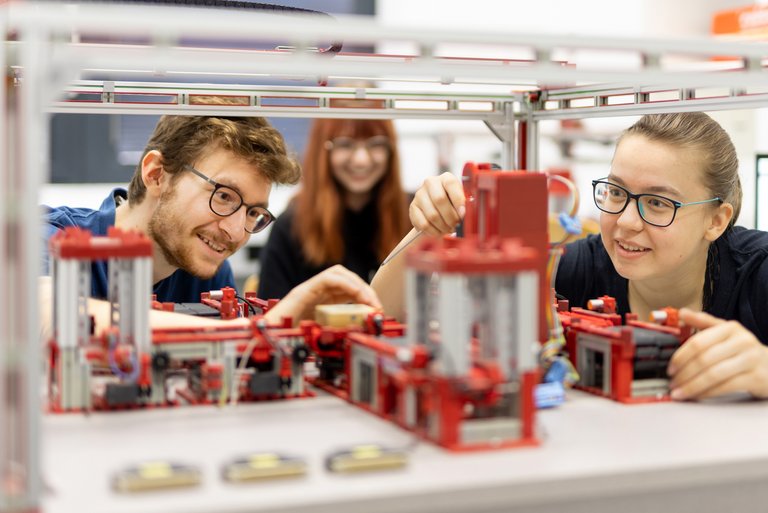
Due to the worldwide pandemic situation since spring 2020, it has been necessary to offer university teaching in hybrid form or completely online. In order to implement the ideas generated here and to further develop ad hoc solutions as well as formats already offered before the pandemic, the examING project was launched at Technische Universität Ilmenau. The project is funded from August 2021 to July 2024 by the "Innovation in University Teaching" foundation and works on finding digitally supported approaches and solutions for the specific requirements of competence development and testing, especially in engineering bachelor's degree programs. Nine university-internal sub-projects, distributed across all departments, are jointly developing solutions, testing them and implementing the results that are found to be good, centrally supported by the University Computer Center and the Central Institute for Education.
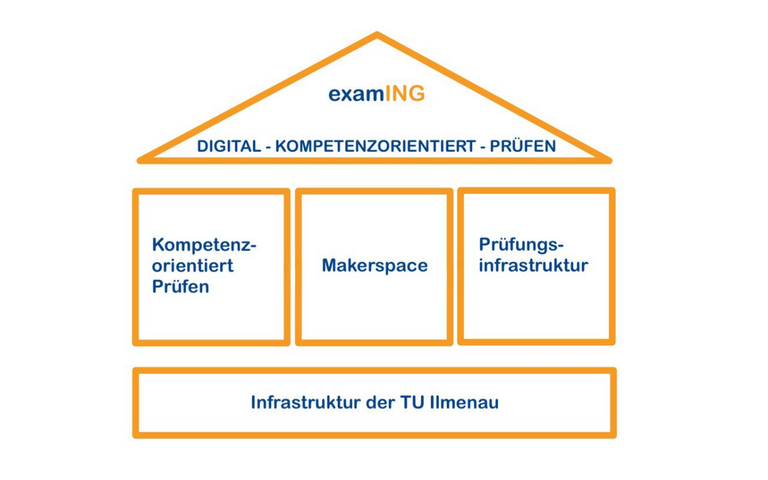
The examING project is built on three pillars and is divided into several subprojects. In addition to setting up a Makerspace, the project is increasingly focusing on solutions on how to conduct subject-specific and competence-oriented examinations in engineering programs. To make this possible, special attention is being paid to the university's infrastructure. Through the nine sub-projects in the departments, the focus is on "Application of software for examinations and teaching", "Digitization of practical training" and "Renewal and adaptation of examination formats to digital requirements"; this is also done in close collaboration between the projects.
Examinations put to the test: competence orientation
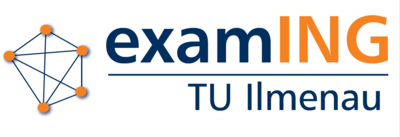
Traditionally, many exams at universities have been written exams with pen on paper: The written exam is still a much-used type of examination. The digitization of exams offers a wide range of potential improvements for both students and teachers. For example, an "e-exam" does not necessarily mean a multiple-choice form with a choice of answer options. Instead, software tools that were used in advance in lectures and exercises, for example, can be included in the final written exam. Instead of being written on paper, solutions can be created with contemporary technology support and submitted digitally as an examination performance. For the students, this means that they can expand their competencies in the scientific fundamentals with application-oriented competencies through appropriate use of technology support and demonstrate them as examination performance. This ensures that there is no break between modern teaching on the one hand and traditional examination situations on the other. In addition, this supports the employability of graduates, which should open up paths to science and industry in equal measure. For the teachers, e-examinations naturally offer the advantage of (partially) automated evaluation and correction support. But it is precisely the possibilities that arise through the integration of e.g. design tools into the examination process that allow teachers to better adapt their examinations to the learning outcomes to be achieved in the courses and also to check them with precision. In addition to redesigning the (e-)exam, this will also lead to the use of other examination formats such as e-portfolios. The nine subprojects of the examING project are each exploring solutions for subject-specific requirements in the engineering sciences.
An e-Examination Auditorium for the TU Ilmenau: Modifications in the Auditorium Maximum
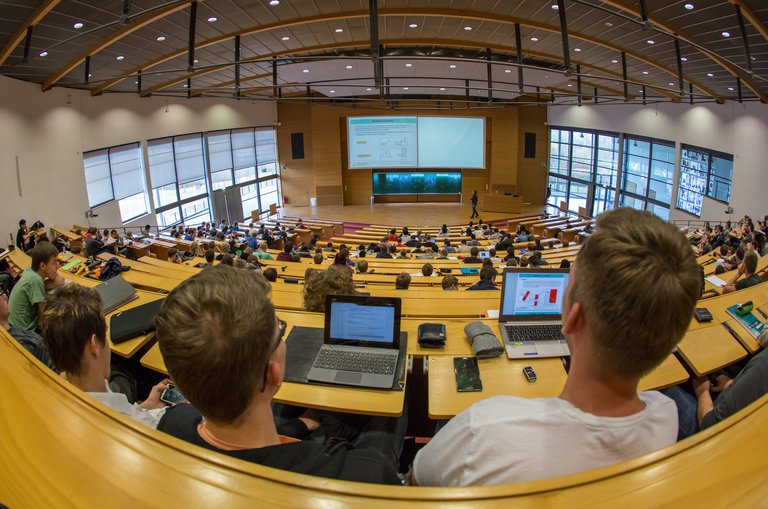
The implementation of digital exams requires infrastructural adjustments. Rooms must be set up in such a way that students can take their exams on existing devices or on their own laptops that they bring with them. The latter approach is being implemented as part of the examING project as a so-called Bring-Your-Own-Device (BYOD) scenario in the university's Auditorium Maximum. For this purpose, the Audimax will be equipped with power outlets at all seats and extended, stable WLAN coverage through additional access points. In addition, loaner devices are available for those students who do not have their own laptop available or whose device is not operational just before the exam.
"The Makerspace: A Makerspace for the TU Ilmenau".
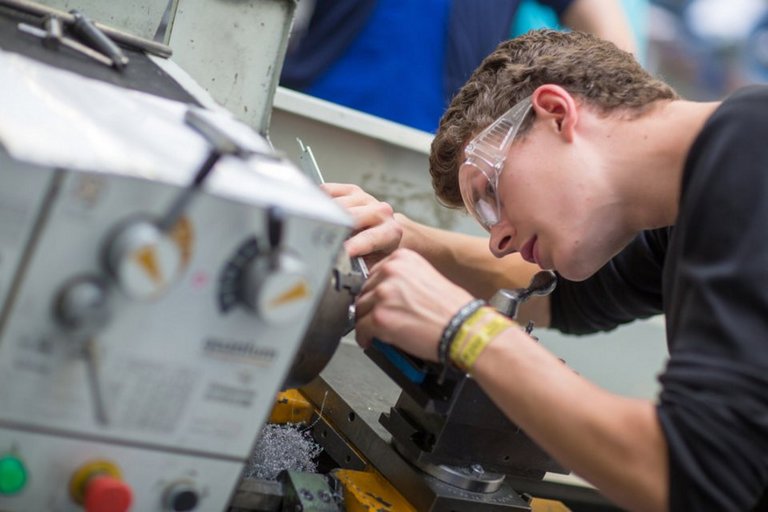
The third pillar of the examING project will be a Makerspace - a maker workshop. Here, the word "makerspace" is to be taken quite literally. A space is to be created that enables practical work in engineering - distributed over several physical locations. Everyone should have the opportunity to implement their own projects and ideas on their own and with professional support. A place to develop creatively and to develop practical skills. In the examING project, work is done on networking existing opportunities and creating new ones. Important components for this Mach-Werkstatt are, for example, the student workshop UNIKAT as well as the teaching workshop, both of which have been located at the TU Ilmenau for many years and provide students with their expertise and support for ideas and projects. In order to make the Markerspace known at the TU Ilmenau and to adapt it to local needs, requirements are collected and stakeholders are involved in workshops. The first workshop took place on Dies academicus in June 2022 under the motto "A Makerspace for the Makerspace", where many ideas were collected with lively participation. These were concretized in a second, also university-wide workshop and will be continuously adapted and evaluated with the participation of all interested parties. There is a consensus that the active participation of teachers and professors as well as the firm integration into the course of studies of the engineers of tomorrow are decisive for the success and continued existence of such a Makerspace.
The makerspace for the TU Ilmenau will be implemented as a "blended makerspace", i.e. the introductory and orientation phase will be mapped digitally. The project implementation then happens on site in the various workshops and workspaces. Presentation opportunities and further offers, such as start-up support from the Ilmkubator, are in turn provided or advertised digitally.
Further information on the project can be found at www.tu-ilmenau.de/examing. News are also posted on Twitter.

